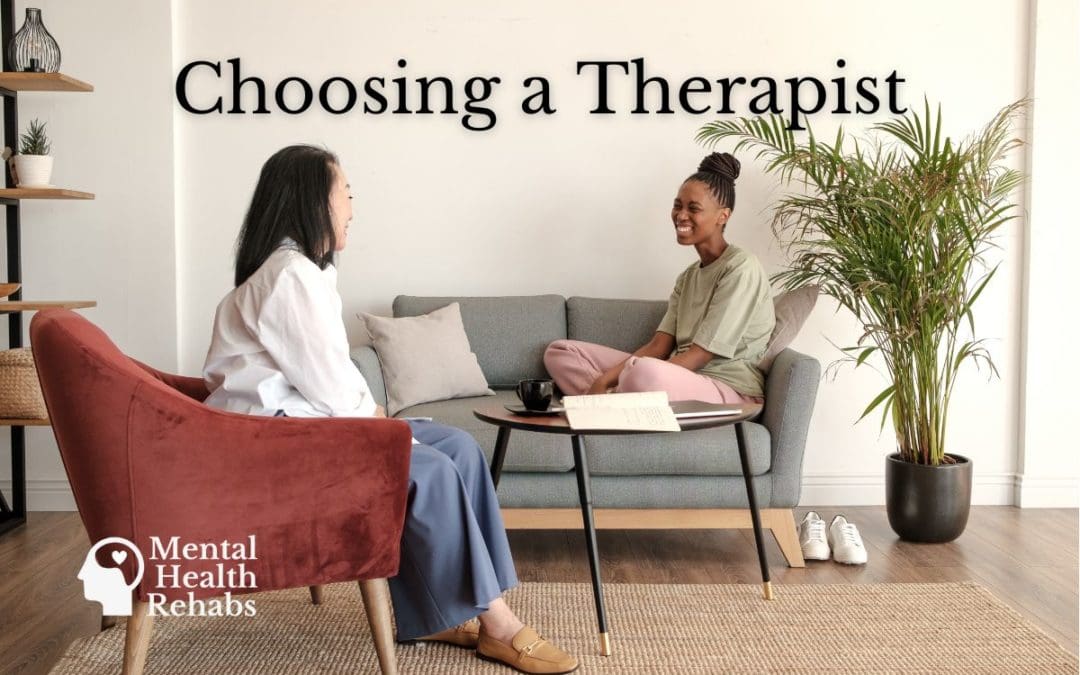You don’t necessarily need to be best friends with your primary physicians in order to have a good check-up. When it comes to mental health, however, research has found that it’s crucial that you have a good relationship with your therapist. So you don’t want to just get on the couch of the nearest one you find (even if you’re on a budget). Instead, here are 6 ways how to choose a therapist that’s right for you.
How to Choose a Therapist
These are the most important factors to consider when choosing a therapist:
Licensing & Certifications
Mental health professionals are often lumped together under the term “therapist”. The truth is that there is a wide variety of different types of professionals who support our mental health.
Psychiatrists are medical doctors who will have “MD” after their name. They are able to diagnose mental illnesses and prescribe medications. Some psychiatrists provide talk therapy, but it’s usually a secondary service they offer–not their specialty.
Psychologists are the second-highest in terms of credentials and may have either a Ph.D. or a master’s degree. These mental health professionals are usually more specialized and mostly help people identify a specific mental health condition through formal assessments. However, they do not actually make official diagnoses. Some psychologists may be able to prescribe medicine, but many are not.
Therapists are likely the term that most of the general public is most familiar with. These professionals focus most on psychotherapy or ‘talk therapy’ and helping people work through the challenges they are facing.
Should you see a Therapist or Counselor?
Technically, therapists and counselors are actually the same things. Your local therapist likely has an LPC, LMHC, or NCC credential. That ‘c’ stands for ‘counselor’ and those are designations for different licenses.
However, as mentioned before, it’s not uncommon for people to refer to anyone who conducts talk therapy as a therapist. So if you’re using the term to refer to a psychiatrist or psychologist, then they are not the same thing as a counselor. In that case, how to choose a therapist or counselor is to determine what your specific psychological needs are: whether you need a formal diagnosis or medication, formal evaluations, specialized help, or simply assistance getting through the challenges your mental health may be facing.
Treatment Specialities
Most mental health professionals will have some area they specialize in. It could be a specific condition (e.g. depression, PTSD, phobias), a particular population (e.g. LGBTQ, veterans), or situational-based issues (e.g. marriage counseling, work-related stress, substance abuse).
Treatment Approach
Additionally, they may also specialize in a particular type of therapy approach (which may or may not be influenced by the specific type of clients they serve). A few examples include:
- Acceptance and commitment therapy (ACT)
- Cognitive-behavior therapy (CBT)
- Dialectical behavior therapy (DBT)
- Exposure therapy
This is helpful to know as some styles of therapy are highly effective at treating specific issues. If you’ve already tried one approach and it was unsuccessful, you can seek someone who uses a different one.
Cost
It’s not tacky or weird to ask your therapist how much they charge per session (typically 50 minutes). This attempt to take care of your mental health would be counterintuitive if it causes financial hardship, so it’s easily one of the most important questions to ask when choosing a therapist. The average rate in the U.S. is between $100 and $200, which can be a pretty penny without insurance. If you find yourself in this boat, check if they offer payment plans.
If you do have insurance, you’ll also want to double-check your insurance plan to see if there’s a limit to the number of sessions that are covered per year.
Personality
One of the most important factors to consider when choosing a therapist is finding a person you click with. Regardless of the reason why you want to go to therapy, your progress can be directly impacted by how comfortable you feel with them (which naturally affects how much you may divulge to them or how much you trust their guidance).
Remember: you’re not looking for a friend in your therapist. You want someone that you trust and feel comfortable with; that makes you feel supported and helps you feel optimistic about your growth potential.
The easiest way to do this is to find a therapist that’s a lot like you. This could mean a person of the same racial background, gender, sexual orientation, or religion–or a combination of these factors. It’s likely that you’ll have an easier time relating to one another.
Finding Your Perfect Therapist Match
Regardless of where you live, whether you prefer in-person or online therapy, you can find a great therapist using our free directory. Keep these tips in mind as you compare and consider different mental health professionals.

